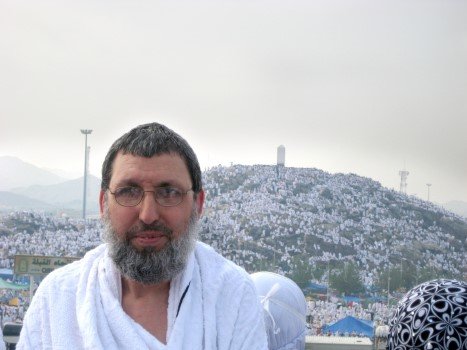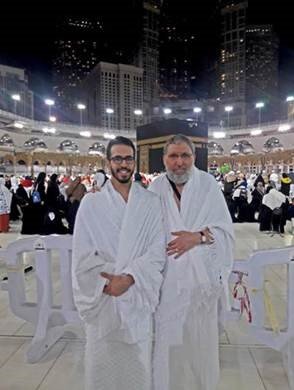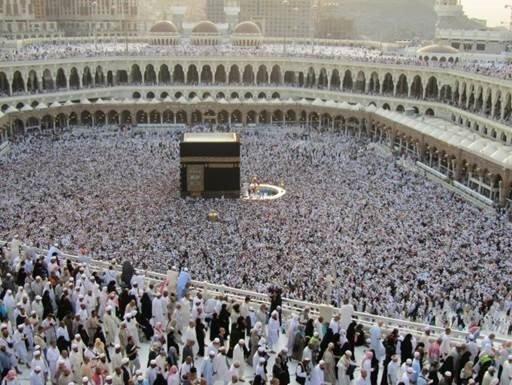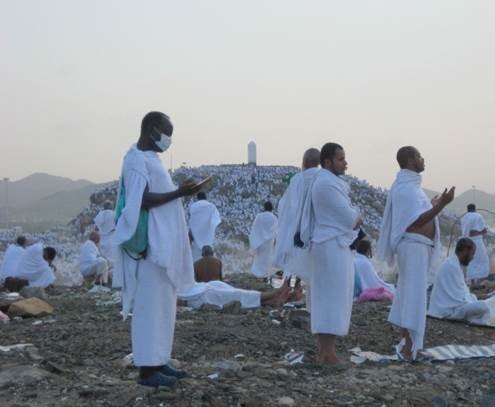Menu
Welcome to IONA Masjid
Your place of worship and learning
Menu
IONA in the News
Muslims Celebrate Eid Al-Adha With Sacrifices Of Their Own (July 19, 2021)

Imam Elturk was able to make the hajj pilgrimage to Mecca” in 2010. Photo courtesy Steve Mustafa Elturk
With nearly 50 percent of Michigan residents vaccinated for COVID-19 and pandemic restrictions lifting, communities are returning to traditional forms of holiday celebrations. But for the second year in a row, an important Islamic tradition has been curtailed worldwide by the pandemic.
For Muslims following the lunar calendar, July 11 marked the first day of the month of Dhu al-Hijjah, Arabic for “The Month of the Pilgrimage.” This is the time when it is customary for Muslims around the world to make the Hajj — the pilgrimage to Mecca, one of the five pillars of Islam.

Imam Elturk with his son Adam in Mecca in 2019. Photo courtesy Steve Mustafa Elturk
This month also marks the annual celebration of Eid al-Adha, the Feast of the Sacrifice, which begins at sunset on July 19 and ends on the evening of July 23. Eid al-Adha honors the willingness of Ibrahim (known to Christians and Jews as Abraham) to trust in Allah (God), who commanded him to sacrifice his son, Ismail (Isaac). Similarly, Jews and Christians believe in this story, as written in the Old Testament’s Book of Genesis.
Traditionally, those of faith celebrate Eid al-Adha by attending mosque for morning sermons and prayer.

Photo courtesy Steve Mustafa Elturk
The five-daylong Hajj is one of the largest gatherings in the world, bringing as many as 3 million to 5 million people to the cube-shaped Kaaba, the metaphorical house of God, in Mecca, Saudi Arabia. Because of the COVID-19 pandemic, however, Saudi officials limited the pilgrimage this year to 60,000 vaccinated people ages 18 to 65 and living in Saudi Arabia. Last year, only 10,000 Saudi residents were permitted to make the Hajj.
“The decision affects nonresidents of Saudi Arabia who desire to perform their once-in-a-lifetime obligation, however, it won’t affect the Eid celebration,” says Troy resident Steve Mustafa Elturk. “Millions of Muslims across the globe will celebrate the Eid as usual.”

Pilgrims supplicate at Hajj in Mecca, prior to the COVID-19 pandemic. Photo courtesy Steve Mustafa Elturk
Elturk, who serves as president and imam, the religious leader for the Islamic Organization of North America in Warren, says Muslims believe that people are born into this world sinless — that it is when we grow up that people become sinners. The idea behind the pilgrimage is to perform penance for one’s sins. Every able-bodied Muslims who can afford it is expected to make the Hajj trip to Mecca once in their lifetime.
“The wisdom behind any pilgrimage is revitalization of faith and renewal of covenant,” Elturk says.
As we move out of pandemic shutdown, mosques are returning to tradition with people standing shoulder to shoulder again in prayer. Those who are not vaccinated are still adhering to the CDC’s social distancing measures, but no one is checking vaccination cards, Elturk says.
As the story goes, just as Ibrahim was about to slaughter his son, an angel replaced Ismail with a ram and told Ibrahim that he had fulfilled God’s commandment and passed the test. From then on, Ibrahim’s obedience to God has been celebrated with pilgrimage and feasting.
“This service typically revolves around pilgrimage and the legacy of Ibrahim,” Elturk says. “Then that same day, some Muslims go out to farms and sacrifice an animal.”
Commonly sacrificed animals include sheep, lamb, cows and camels. After the animal has been sacrificed, meat is distributed equally among family, friends and the less fortunate members of the community.
It is considered an essential practice to chant the takbir — the Arabic phrase “Allāhu ʾakbar,” meaning “Allah is the greatest” — before the Eid prayers on the first day and after prayers throughout the four days of Eid.
Elturk says it is common throughout the Middle East for Muslims to take four days off work to visit with family and friends, but those in Western societies generally take only one day off work.
About IONA

IONA's objective is to help the Muslims of North America understand and fulfill their divinely ordained obligations, in order to please Allah (SWT) and thereby achieve success and salvation in the Hereafter.
Join Our Mailing List
Copyright © All rights reserved. Islamic Organization of America.

